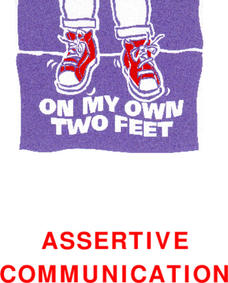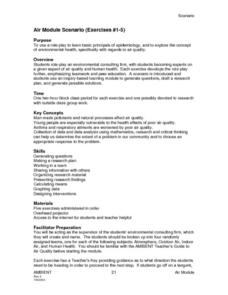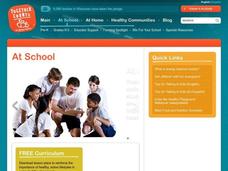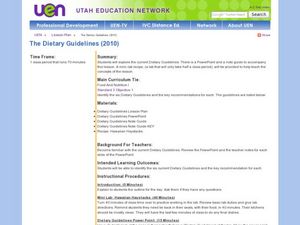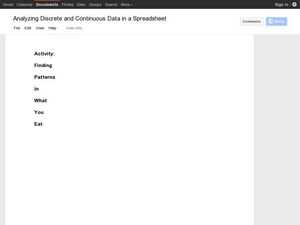Department of Education (Ireland)
Assertive Communication
Assertive communication is an acquired skill. Teaching young people to ask for what they need and to believe that they have a right to ask is at the core of a unit on assertive communication. Over the course of the unit, middle and high...
Curated OER
The Human Body
Explore the human body through hands-on activities. Young learners will trace their bodies and place cut out body organs in the proper place, print patterns using cut fruit, sing songs about good nutrition, and use their five senses...
Curated OER
Benefits of Indoor Plants
Students diagram a plant. In this Science lesson, students explore the concept of photosynthesis focusing on the oxygen production. Students calculate the amount of plants needed to filter the air in their classroom.
Curated OER
An Introduction to Nutrition
Whether you need a new textbook for your health class, or a few exercises and passages for your lesson on nutrition, you'll find what you need with a thorough nutritional science resource. With 15 chapters that cover elements of...
Curated OER
Show Me Economics - Families Have Needs
First graders explore the four basic needs. Through discussion, 1st graders discover that all people need food, clothing, shelter and love. They create a collage representing the four basic needs. Students sing songs about basic needs.
Curated OER
Touch and Abstinence
FLASH has put together another good lesson about touch and abstinence. Humans need human touch, yet many confuse this need for touch, and their desire for sex. Discuss the four types of touch with your health or teen issues class. There...
Curated OER
Air Module Scenario (Exercises #1-5)
Students, after researching/analyzing the concept of environmental health to air quality, role-play the basic principals of epidemiology. They act out a specific scenario to generate questions, draft a research plan, and generate...
Curated OER
Lesson 23: Reproduction - Day 5: Birth Control
Students with mild to moderate disabilities discuss human reproduction and the importance of preventing pregnancy. They review reproductive anatomy, sexual decision making, and what birth control is. The lesson concludes with a...
Curated OER
Nutrition
Students create a video incorporating clay animation and skits. Using their video creation, students explain and explore the five basic food groups, nutrition news, nutrients, benefits and food examples. They maintain a food journal,...
Curated OER
Activity Plan 5-6: All About You And Me
Students explore their unique qualities as they create "me" puppets. In this early childhood lesson, students play a category game, discuss uniqueness, and create their very own "me" puppets.
Curated OER
Basic Introduction to Foundation of Life: Genes, Genetics and Genetic Diseases
Students are introduced to genetics along with genetic diseases and heredity. In groups, they complete a Punnett Square to determine the dominant and recessive genes. After viewing diagrams, they identify the characteristics of DNA and...
Curated OER
Freddie Feels
Students become aware of the sense of touch and the body parts effected by touching. In this five senses activity, students touch mystery items and create a touch page. Students discuss the body parts connected to the sense...
Curated OER
Healthy Eating
Fourth graders learn the five basic food groups and what each one consists of. They develop an understanding of why eating healthy is important. They have background knowledge in healthy eating due to the exposure in previous health...
Curated OER
Your Energy In
What are Dietary Guidelines? What are the basic principles of a sensible healthy diet? What do variety, balance, and moderation have to do with eating healthy. What are the food groups? There are a couple of activities in this lesson...
Curated OER
Home Living / Daily Living Lesson Plan—Mastery Healthy Food
Everyone needs to know how to eat well to stay healthy. Learners with mild disabilities log what they eat, discuss food choices, and review healthy foods. The lesson could be used to foster living skills in high-functioning individuals...
Curated OER
You Are What You Eat (The 6 Main Nutrients Found in Foods)
Students study how carbohydrates, proteins, fats, vitamins, minerals and water provide basic nutrients for body growth and function. They describe quality sources of the basic nutrients and the importance of water.
Curated OER
HIV/AIDS: Basic Facts
Students complete worksheets and play the "Onion Ball Question and Answer Game" as an introduction to the basic facts about AIDS and HIV, such as what the virus is, the body fluids that transmit the virus, and the the most common methods...
Curated OER
Communication 1: The Basics
Students identify the differences between assertive, aggressive, passive and manipulative behaviors. They relate each behavior to a relationship they have with a family member.
Curated OER
Who am I and Why?
Students make comparisons about themselves and others, which are real and meaningful. They study some basic concepts in the area of genetics and do a complimentary series of experiments, or explorations that illustrate these concepts
Curated OER
The Dietary Guidelines (2010)
In a mini-lab, the class will prepare Hawaiian Haystacks to eat. A note-taking worksheet is included for learners to use during a PowerPoint presentation about six basic dietary guidelines. Most of the time required for this activity is...
Curated OER
Community Health
This resource has many links to basic concepts behind nursing and wellness. Learners will define the terms community and health to then describe the six basic elements of community health practice to be used in nursing. This is an online...
Curated OER
Nutrition in Me!
Third graders explain the basic healthy eating and physical activity concepts. In this healthy lifestyles activity, 3rd graders describe two main components of a healthy lifestyle, demonstrate two different types of physical...
Curated OER
Analyzing Discrete and Continuous Data in a Spreadsheet
You are what you eat! Your statisticians keep a log of what they eat from anywhere between a day to more than a week, keeping track of a variety of nutritional information using a spreadsheet. After analyzing their own data, individuals...
